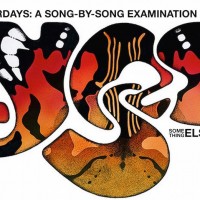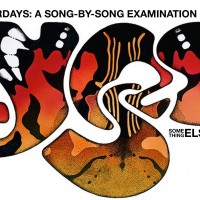Yes, the world’s greatest progressive rock band, has long been in a state of perpetual change. That starts with their 1969 self-titled debut, a promising blend of jazz, rock and folk that only hints at the greatness to come.
Yes would, of course, jump light years ahead with 1971’s The Yes Album, but only after beginning a series of personnel changes. That said, Yes — which begins with “Beyond and Before” — still sounds as fresh and adventuresome as it did in 1969, if not quite sound like the classic Yes to come.
You’ll hear hints of the best-known sound put forth by the lineup of Jon Anderson, Chris Squire, Steve Howe, Rick Wakeman and Alan White in this leadoff song, but “Beyond and Before” — composed by bassist Squire and writer Clive Bailey — actually owes more to the psychedelic bands of the era than the precise, almost classically driven latter-day Yes masterworks.
Credit for that goes to original Yes guitarist Peter Banks, who creates the defining element of this song with his twangy and aggressive approach. His distorted and aggressive playing differs dramatically from his Yes successor Steve Howe (or Trevor Rabin and Billy Sherwood, for that matter). The former Mabel Greer’s Toyshop guitarist always sounds as if he’s about to fly off the rails.
Still, Peter Banks’ approach perfectly complements Chris Squire’s aggressive bass work — which, even in this early example, is innovative and well, progressive. Equally effective is the jazz-inspired, deeply nuanced playing of drummer Bill Bruford. Always the epitome of taste, Bruford makes his minimalist drum set sing. Meanwhile, Tony Kaye’s Hammond organ never intrudes, interacting perfectly with the rhythm section.
What’s missing? Yes singer Jon Anderson (another Mabel Greer’s Toyshop alum) is relegated to a harmony role with Squire, and doesn’t make himself fully known just yet. One of the things that help forge the Anderson/Squire partnership was the duo’s love of harmony. On Yes’ “Beyond and Before,” that love is displayed — and we all know the partnership will lead to many more fantastic vocal interactions and classic songs. Even though this is only 1969, Yes is already hinting at great things to come.
- Fernando Perdomo – ‘Waves 5’ (2025) - May 13, 2025
- Jaime Ospina – ‘The Vessel/La Vasija’ (2025) - May 11, 2025
- Chicago Jazz Orchestra with Bobby Broom – ‘More Amor: A Tribute to Wes Montgomery’ (2025) - April 19, 2025




Still a stunning album. Yes were always able to compose wonderful passages of music and somehow create songs around them. This is a great example off the YES album and think about Harold Land and Survival as well. Just lovely stuff.
Still one of my fav early Yes tracks
I really learned to love this track and album just last year in 2014. You’re right–it’s pure psychedelia, and that magical moment at the end when it gets really quiet– gentle guitar effects and harmonies– that’s when you see what Yes would be become eventually.